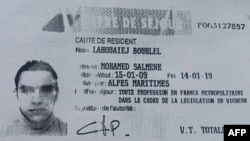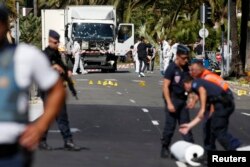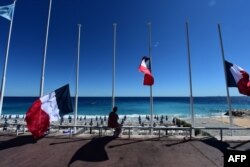French police are racing to piece together the criminal background and Islamic fundamentalist ties of the 31-year-old French-Tunisian who carried out Thursday’s Bastille Day attack in Nice that killed 84 and has left another 50 people fighting for their lives.
Mohamed Lahouaiej Bouhlel's petty criminal profile is similar to the unruly backgrounds of the assailants who carried out the 2015 Charlie Hebdo shootings and the Paris attacks last November. All of them were members of jihadist terror cells built on kinship and friendships forged in childhood, jail or as petty criminals in closely knit poor neighborhoods.
French officials are working on the theory that Lahouaiej Bouhlel, a self-employed delivery truck driver, was not working entirely alone and that other members of a terror cell he may have belonged to may unleash further beach resort attacks in the coming days.
Police are questioning the attacker’s relatives. The home of the suspect in the stockyards area east of Nice was raided Friday morning by officers of the elite national police unit, French officials confirm.
“People who knew him say he was a loner but we can’t rule out he was part of a network and recruited and not just a lone wolf, then the question for us — and one we have to answer quickly — is are there other immediate attacks looming?” a French counterterror official told VOA.
'Pop jihadists'
Neighbors interviewed by French media describe him as a man who kept to himself. They say also he showed no outward signs of being religious. That is not unusual among recent French and Belgian jihadist recruits. Several members of the terror group that struck Paris in November pursued secular lives, often involving drug-taking and petty crime, even after becoming jihadists or during their rapid radicalization process.
Mohamed Abdeslam, the brother of one of the Paris bombers Salah Abdeslam, told reporters his brother attended mosque just occasionally and showed no signs of having become a radical.
In France, jihadists have been highly active in recruiting in and out of jails among minor criminals and drugs dealers: the Charlie Hebdo assassins and Amedy Coulibaly, who in January gunned down shoppers at a Jewish delicatessen in Paris, all had petty criminal backgrounds.
Rik Coolsaet, a university professor and senior fellow at the Egmont Institute, an independent think-tank based in Brussels, dubs the new generation of recruits as ‘pop-jihadists,’ arguing that their radicalization is tied up with their past histories of deviancy. “If I were an old-fashioned jihadist I would consider these new recruits, wannabes and not the real thing,” said Coolsaet, a member of the European Network of Experts on Radicalization, a group convened by the European Commission.
“Going to Syria or joining the Islamic State has become a kind of alternative outlet for deviant behavior —like street gangs or juvenile delinquency or drug-trafficking,” he told VOA recently.
Celebrated by IS
When it comes to Lahouaiej Bouhlel, women neighbors say they were unnerved by him. “I passed him all the time. Very bad, he never held the door. He stared at us,” 40-year-old Jasmine told Le Monde newspaper. When asked a question he would often not respond. “It frightened us, my children and me.”
The 31-year-old was known to the police for petty crime and last March he was up before the local courts on an assault charge, although he received a six-month suspended sentence and did not go to jail. Counterterror officials say he was unknown to them before the attack and he was not listed in their database as a possible jihadist.
But his act was clearly premeditated, officials say. On Wednesday, he rented the truck in a nearby town in Provence-Alpes Cote d’Azur and placed dummy weapons in the back of it.
So far neither the Islamic State terror group nor al-Qaida have claimed formal responsibility for the attack. But within minutes of it, IS supporters were celebrating with tweets and social media postings, claiming it was in revenge for the death of Abu Omar al-Shishani—the terror group’s "minister of war"—who was killed, it was reported by IS this week.
A poster showing the Eiffel Tower in flames and a knife-wielding jihadist was being widely shared on IS social media sites and on Twitter celebrating the Nice terror attack.
“This is the beginning of the attack to take the holy revenge for the killing of Abu Omar Shishani, may Allah accept him,” a jihadist posted on the group’s al-Minbar forum.
Beach resorts targeted
The use of a truck in the killings is also significant and suggests at the very least Lahouaiej Bouhlel was influenced by IS propaganda.
Since 2014 the group’s chief propagandist Abu Mohammed al Adnani has been urging supporters to run westerners over with vehicles saying in one call to action that they should kill disbelieving Americans and Europeans “especially the spiteful and filthy French.”
On one message he said: “Smash his head with a rock, or slaughter him with a knife, or run him over with your car, or throw him down from a high place, or choke him, or poison him.”
In April, German and Italian intelligence agencies warned that IS was planning terror attacks this summer across Europe and would likely target holiday-makers and tourists, even posing as ice cream and T-shirt sellers on beaches.
Nice has long been of special concern to French officials, who say young second and third generation immigrants living in the city’s poorer neighborhoods are being disproportionately recruited when compared to similar sized cities elsewhere in France.
Two years ago French police thwarted a planned bomb attack on the capital of the French Riviera. France’s General Directorate for Internal Security said Ibrahim Boudina, a young Frenchman born in Algeria who fought with jihadists in Syria, planned to detonate bombs during the city’s highly popular carnival. He was arrested near Cannes 48 hours before the 2014 carnival. Few details of the bombing plot have been revealed by French officials.
Later in 2014, a family of 11 left Nice to join IS in Syria.
And more significantly, Nice was the childhood home of one of France’s most infamous jihadist recruiters, Omar Diaby. Known also as Oman Omsen, he has boasted publicly of having recruited more than 80 young Frenchmen — 15 from Nice alone. He was thought to have been killed in 2015 but appeared this year in a documentary, saying he had staged a fake death.







